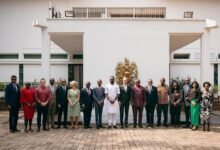Communication strategy to grasp EU opportunities in timber sector developed

The Kumasi Wood Cluster (KWC) and the Ghana Timber Millers Organisation (GTMO) have introduced an innovative marketing communication strategy to help the private sector capitalise on opportunities in the European Union (EU).
The initiative, christened ‘Message House’, developed in collaboration with government and civil society, will communicate measures Ghana has put in place to meet the EU criteria for wood and wood products.
This falls under the Voluntary Partnership Agreement (VPA), a bilateral timber-trade agreement between the European Union and the timber-exporting country outside the Union.
It is a key element of the EU Forest Law Enforcement, Governance and Trade (FLEGT) signed over a decade ago, aimed at addressing illegal logging.
Mr Kofi Afreh Boakye, the Chief Executive of the Domestic Lumber Traders Association, at a workshop in Accra to discuss the communication strategy, said the ‘Message House’ would help the private sector to market itself.
The workshop also updated stakeholders on effective messages the private sector would advance to promote and communicate the essence of Ghana’s legal timber on the European Market when licensing is ready.
Mr Boakye assured the international community, especially the EU, that Ghana had met the sustainability and legality requirements for wood to be exported.
He disclosed that in the past, a miscommunication of those processes and the absence of information on sustainability resulted in doubts among majority of EU countries over the sustainability of Ghana’s timber products.
“The Europeans are more concerned about how sustainable Ghana’s legal wood system is and this is a platform where we can tell the whole world that we are not only interested in legality but also sustainability,” he said.
However, the KWC and the GTMO is implementing a six-month project titled, ‘Development of private sector-focused messages for Ghana’s FLEGT license communication strategy,’ funded by the Food and Agriculture Organisation-EU FLEGT Programme. The project is to make available facts and figures to support messages to be carried by Ghana’s overall FLEGT licensing communication.
When ready, exporters of timber and timber products would have to meet certain criteria for FLEGT licenCes to be issued on the products they export to Europe. With this new communication strategy, licences issued under the FLEGT-VPA will be worthwhile.
As part of the project activities, a photo catalogue; Ghana Wood Digest, of exported timber products, company facilities and national infrastructure have been designed.
Mr Adjei Yeboah, former Deputy Minister of Lands and Natural Resources, said: “It is very important that our messages are strong enough. We are not just talking about an industry. It is not cosmetic.”
“It is good we are doing this and I pray we would be able to articulate it well to the international community.”
He debunked assertions that Ghana was not doing things right in the past, necessitating the creation of the ‘Message House’ and said initially emphasis was not placed on communication sustainability.
Ghana’s timber sector develops communication strategy to grasp EU opportunities GNA






